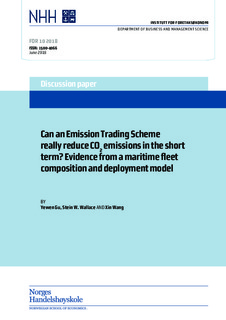Can an Emission Trading Scheme really reduce CO2 emissions in the short term? Evidence from a maritime fleet composition and deployment model
Working paper

Åpne
Permanent lenke
http://hdl.handle.net/11250/2503388Utgivelsesdato
2018-06-27Metadata
Vis full innførselSamlinger
- Discussion papers (FOR) [566]
Sammendrag
Global warming has become one of the most popular topics on this planet in the past decades, since it is the challenge that needs the efforts from the whole mankind. Maritime transportation, which carries more than 90% of the global trade, plays a critical role in the contribution of green house gases (GHGs) emission. Unfortunately, the GHGs emitted by the global fleet still falls outside the emission reduction scheme established by the Kyoto Protocol. Alternative solutions are therefore strongly desired. Several market-based measures are proposed and submitted to IMO for discussion and evaluation. In this paper, we choose to focus on one of these measures, namely Maritime Emissions Trading Scheme (METS). An optimization model integrating the classical fleet composition and deployment problem with the application of ETS (global or regional) is proposed. This model is used as a tool to study the actual impact of METS on fleet operation and corresponding CO2 emission. The results of the computational study suggest that in the short term the implementation of METS may not guarantee further emission reduction in certain scenarios. However, in other scenarios with low bunker price, high allowance cost or global METS coverage, a more significant CO2 decrease in the short term can be expected.